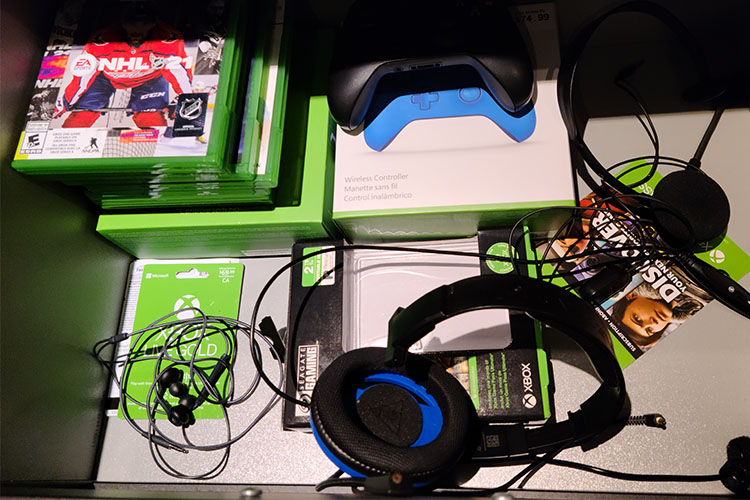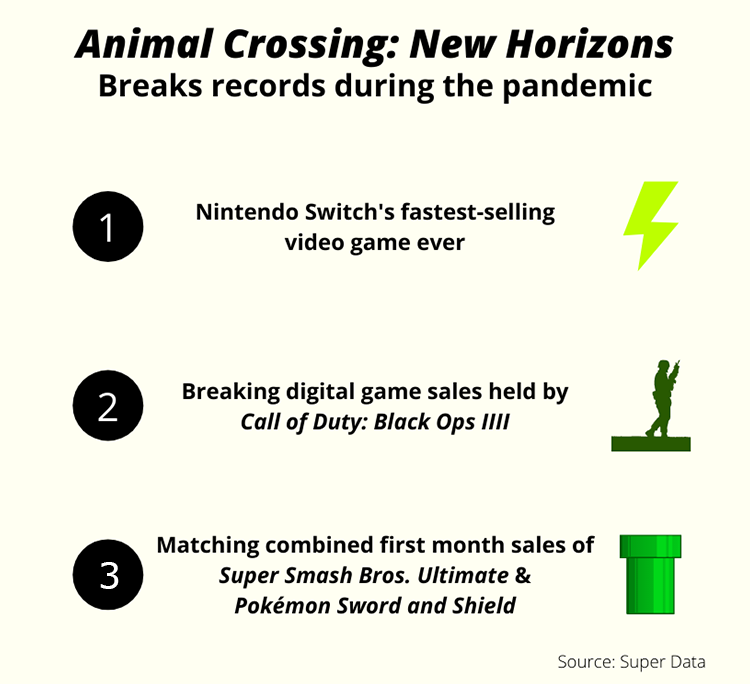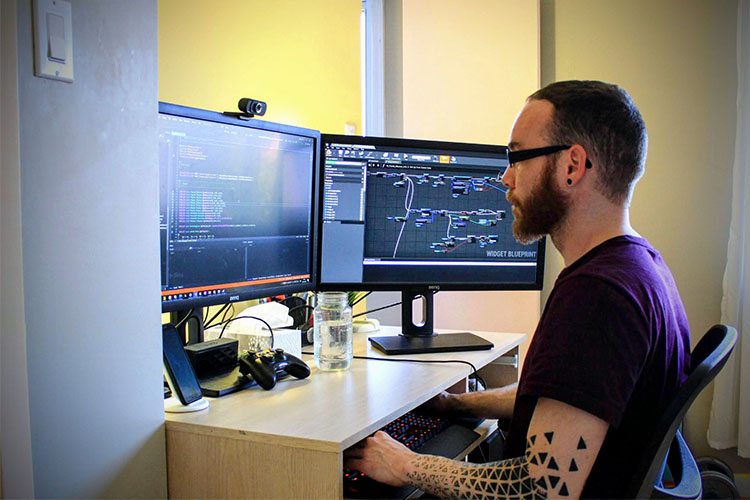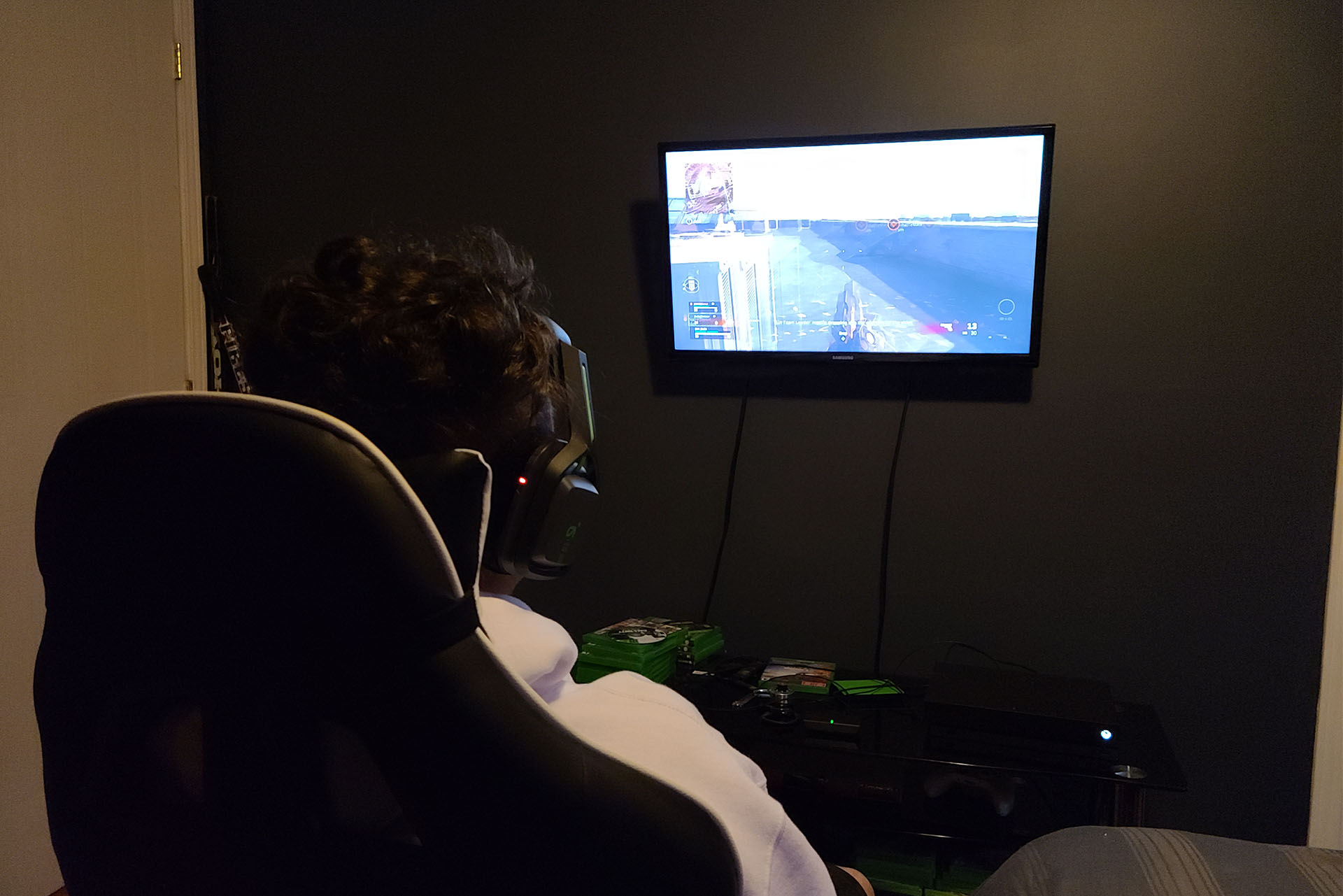BY Alec Brideau & Jacob Carey
“I stopped playing video games for a couple of years, but used to be a good player at League of Legends in high school,” says Liam Sharp. “This last year, I got back into a bunch of video games with my friends as a way to keep in touch, and got back to the old days of gaming until 4 a.m. since we had more free time.”
Sharp isn’t the only one jumping into video games since the COVID-19 pandemic. In fact, the new PlayStation 5 (PS5) and Xbox Series X consoles have been out of stock almost everywhere since they were released last November.

People are buying and testing video games while being stuck at home. Photo by Alec Brideau.
The Nintendo Switch console and Animal Crossing: New Horizons video game established new sales records in March 2020. The video game’s popularity created a console shortage that lasted several months.

Animal Crossing: New Horizons breaks the Nintendo Switch console game record of the most digital units sold. Media by Alec Brideau.
Despite being limited to online sales for a good part of the past year, Carl Tellier, the sales supervisor at Best Buy in Rosemère, says he notices strong sales growth in video games.
“The production from manufacturers like Sony [PlayStation] and Microsoft [Xbox] is very slow because of the high demand right now,” Tellier says. “For us in stores, we are yet to receive the new consoles.”
That success is having its effect her in Montreal, the fifth-largest video game hub in the world. The city hosts 200 studios, employing 15,000 people.
“The video game market is extremely aggressive,” says Julien Sénécal, production manager at Ubisoft Montreal. “There’s a lack of resources because of how active Montreal’s hub is. There must have been 10 hirings per week at Ubisoft Montreal [in the last year]. It obviously slowed down at the beginning of the pandemic, but for the past few months, it’s back to business as usual.”

Ubisoft Montreal is the largest video game development studio in the world and has over 3000 employees. Photo by Jacob Carey.
It’s not just the sales that are going well. User interface (UI) programmer Bruno Baril left Ubisoft five months ago and joined Tuque Games, another video game company in the city. He says there’s no concern for people working in the industry, despite the pandemic.
“I know many people who got hired in the field,” Baril says. “We’re even receiving job offers sometimes [even if we’re already working somewhere], so I don’t think the industry has stopped hiring, or slowed down.”
Baril says there are benefits to working from home, including that it’s easier to stay focused on the task at hand.
“You’ll have work to do, emails to answer and online meetings, but most of the time you can decide when to do your work,” Baril says. “You are more free in your time management, compared to if you’re working in a studio with someone coming at you, saying there’s a last-minute meeting or stuff like that.”

Baril works from home since last year and is yet to meet his new colleagues from Tuque Games in person. Photo by Alec Brideau.
Sénécal says he also realizes that many people tend to be more available from home. The company had to modify the schedules of many employees, but it’s been profitable for the most part.
“We’ve had people, and still, working earlier or later than normal,” Sénécal says. “We’re also realizing that people tend to be available more when working from home, especially since they’re saving travel time.”

Call of Duty is a popular video game among players during the pandemic. Photo by Alec Brideau.
Sweet Baby Inc. is a narrative development company providing stories for video games. The company’s co-founder and CEO Kim Belair says working from home has helped increase her demands.
“Since we’re kind of an agency that’s working with different companies, we don’t have time to go to every office,” Belair says. “What’s nice is that since everyone’s working remotely now, we can collaborate on even more playing fields. People are more willing to work with writers who are far away, and work with people from different time zones and countries, which helps Montreal’s hub even more.”
Belair says that despite losing live interaction in the last months, Montreal’s industry has gained a lot. By being more flexible with schedules, it has put a spotlight on the profession’s imperfections.
“I think that even some of the bad things that have happened in the industry this past year, like people being out of gas, are good things in the sense it’s allowed us to see important problems in the industry,” she says. “Daycare is still a major issue, as some companies are still failing to provide it. We’re starting to see what we need, and hopefully we’ll [have changes].”
Esports has gained in popularity in Montreal since last year. Video by Jacob Carey.
As a global hub, one of the biggest problems facing Montreal’s video game industry is keeping up with demand..
“I think it’s a very healthy field right now,” Sénécal says. “Companies are ripping off resources from each other. We’re thousands working in the industry in Montreal, so it seems to be going all fine.”




